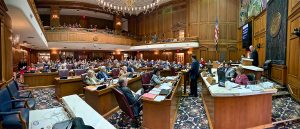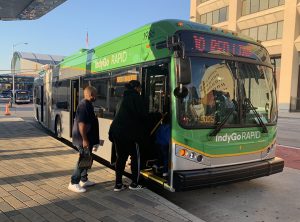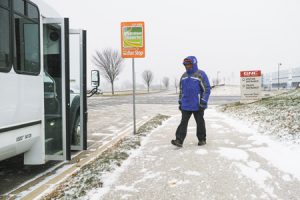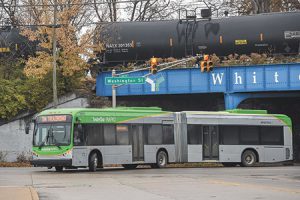
IndyGo in line for nearly $45 million in federal COVID-19 relief
IndyGo is among transit operators nationwide that will share $25 billion in federal aid as part of the Coronavirus Aid, Relief and Economic Security Act.

IndyGo is among transit operators nationwide that will share $25 billion in federal aid as part of the Coronavirus Aid, Relief and Economic Security Act.

COVID-19-related driver shortages, among other factors, mean that route improvements planned for June now won’t happen until 2021.

Just in the past month or so, lawmakers have debated proposals to prohibit cities from regulating landlord-tenant relations, allow the attorney general to step in when a local prosecutor decides not to pursue a case, and cut funding to IndyGo—which might stop construction of future bus rapid-transit lines.

House Bill 1279, authored by Rep. Ed Soliday, R-Valparaiso, initially only addressed a regional development group in northwest Indiana. But an amendment sought to put teeth in a 2014 state law that required IndyGo to raise private dollars to help finance its mass transit operations.

This is the second time IndyGo has extended the free period on the Red Line, which was originally set to begin collecting fares Oct. 1. IndyGo said its new ticketing system from vendor Flowbird isn’t yet ready for use.

The new payment system IndyGo has paid Paris-based tech firm Flowbird Group to design and implement will not be ready by Oct. 1, the day riders were to start paying for Red Line service.

IndyGo says riders took about 8,200 trips on the Red Line on Sunday, the first day the bus rapid transit line was in service.
The first phase of IndyGo’s bus rapid transit project, the Red Line, remains on schedule for a Sept. 1 debut.
The new rules cap the number of licenses for dockless shared-use mobility companies in Indianapolis and mandate that those companies deploy a certain number of scooters to different areas of the city.
Lyft, the San-Francisco-based ride-sharing company, has plans to deploy as many as 1,200 scooters in Indianapolis after receiving final approval from the city Thursday.
IBJ reporter Susan Orr talks with host Mason King about how Indy’s weather is contributing to the problem, what IndyGo wants BYD to do about it and what other city got so fed up it sent its buses back to the company.

IndyGo says the electric buses it intends to use on the Red Line have been unable to run the 275 miles on a single charge that was promised by manufacturer BYD Ltd.

House Bill 1365, authored by Indianapolis Democrat Justin Moed, removes the existing state law from 2014 that bans light-rail mass-transit projects in Indianapolis.
The goal is to preserve or spur development of 1,000 affordable housing units within close distance of an Indianapolis transit stop over the next five years.
Speeding up construction is expected to shave four months off the 13-mile bus line project.
Michael Terry oversaw IndyGo at a critical time. In 2016, the agency successfully asked Marion County taxpayers for increased revenue in a tax referendum. The agency is now carrying out a plan to build three bus rapid-transit lines in Indianapolis.
One of the bills would restrict changes that could be made to the Interstate 65/Interstate 70 inner loop around downtown. Another would remove the ban on light-rail projects in Indianapolis.
The Indianapolis company, formed in 2009, makes apps that allow users to track buses in real time and hail rides on demand. It is merging with Ride Systems LLC to gain more users and build market share.

Boone County has been deluged with announcements about new businesses with new jobs, but filling those jobs could be challenging in a fairly rural area with a rock-bottom unemployment rate.

IndyGo and bus maker BYD Ltd. say they’re confident the electric buses Indianapolis plans to use for the Red Line will meet the system’s needs.